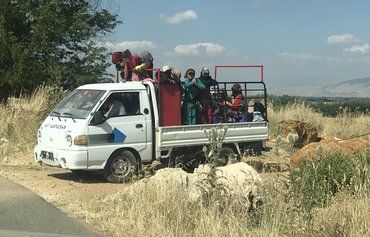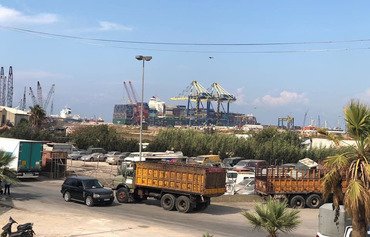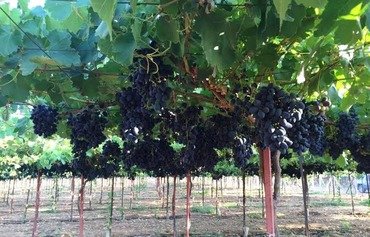BEIRUT -- Farmers are looking forward to a Saudi decision to resume the import of agricultural products from Lebanon, which the kingdom suspended in April 2021 after it intercepted a Captagon shipment concealed among pomegranates.
Hopes for a resumption of imports -- at a time of crisis for the agricultural sector in Lebanon -- were raised by Prime Minister Najib Mikati's announcement of Saudi Arabia's decision to reopen its markets to Lebanese products.
The remarks, made while Mikati attended the Arab League summit in Jeddah on May 19, did not specify a date for implementation, pending an official statement in this regard.
Minister of Industry George Boujikian and Minister of Agriculture Abbas Hajj Hassan said talks with their Saudi and Gulf counterparts confirmed that the resumption of Lebanese exports to Gulf countries is on the right track.
![An apple orchard is seen here in the town of Ain Zebdeh in the western Bekaa Valley. The valley is Lebanon's agricultural hub, with the majority of its population working in agriculture and dependent on the revenue generated from the export of produce. [Nohad Topalian/Al-Mashareq]](/cnmi_am/images/2023/07/06/42682-leb-bekaa-valley-600_384.jpg)
An apple orchard is seen here in the town of Ain Zebdeh in the western Bekaa Valley. The valley is Lebanon's agricultural hub, with the majority of its population working in agriculture and dependent on the revenue generated from the export of produce. [Nohad Topalian/Al-Mashareq]
![Corn is beginning to occupy large areas of the Bekaa Valley after the Russian invasion of Ukraine forced an end to purchases of Ukrainian corn. [Nohad Topalian/Al-Mashareq]](/cnmi_am/images/2023/07/06/42685-leb-corn-crop-600_384.jpg)
Corn is beginning to occupy large areas of the Bekaa Valley after the Russian invasion of Ukraine forced an end to purchases of Ukrainian corn. [Nohad Topalian/Al-Mashareq]
A painful blow to farmers
"The losses incurred by farmers as a result of the suspension of exports to Saudi Arabia on account of the drug smuggling are massive," Lebanese Farmers' Association president Antoine Howayek told Al-Mashareq.
He blamed Hizbullah for the demise of Lebanon's economic relationship with Saudi Arabia.
Lebanon's agricultural exports to the Gulf states in 2020 "amounted to 312,600 tonnes, at a value of $145 million", he said, of which 50,000 tonnes -- $24 million in value -- went to Saudi Arabia.
Drug smuggling in shipments of agricultural produce "was a painful blow to us, at a time when the state did not take measures, such as controlling the borders with Syria, to enable us to reroute the export of our produce", Howayek added.
He said Saudi Arabia will not resume importing agricultural products until the border with Syria is brought under control and drug smuggling stops.
Meanwhile, the agricultural sector's annual losses amount to "hundreds of millions of dollars from the Saudi and Gulf markets", he said.
In Arsal, a region renowned for the cultivation of cherries, apricots, vegetables and herbs, farmer Mahmoud al-Flaiti bemoaned the ongoing export ban.
"We are farmers," he told Al-Mashareq. "We are incurring thousands of dollars in losses, and the crops are piling up."
"We live daily under the spectre of the loss of our crops, because the Lebanese market can no longer bear price hikes because of the severe financial crisis that has affected every home," al-Flaiti said.
Drug smuggling's harmful impact
Tony Tohme, who heads the economic committee of the Chamber of Commerce, Industry and Agriculture in Zahle and the Bekaa, is one of the largest exporters of potatoes and table grapes to Saudi Arabia and the Gulf.
Thousands of local farmers relied on the export of their produce to the Gulf, he told Al-Mashareq.
"The export of drugs from and through Lebanon to Saudi Arabia has harmed the export of our produce -- as if the impact of the economic and financial crisis on us were not enough," Tohme said.
It has also damaged Lebanon's historical economic relations with Saudi Arabia and the Gulf, he added.
Behind the drug smuggling are "organised networks engaging in money-laundering and bringing dollars [into Lebanon] amid the proliferation of Captagon factories in regime-controlled areas of Syria", Tohme said.
He noted that Hizbullah, which has been implicated in drug production and trafficking, "controls the illegal crossings between the two countries".
"We, as farmers and exporters, paid a heavy price for the drug smuggling," he said.
"We have incurred billions of dollars in losses since Saudi Arabia and some Gulf countries suspended the import of our produce, and we may reach a point when we won't be able to continue on, especially in the Bekaa Valley."
The Bekaa Valley accounts for 43% of Lebanon's land mass, and 80% of the valley's population works in agriculture.
The Gulf market, and specifically the Saudi one, "was one of the most important markets for Lebanese agricultural and industrial products", economic writer Antoine Farah said.
"It was the main pillar for supporting Lebanese exports, and consequently the closure of the Saudi market had a devastating impact on the Lebanese economy."
"The closure of the Saudi market to Lebanese agricultural products is a consequence of Hizbullah's political practices and its actions related to the ... smuggling of drugs into the kingdom," he said.

![Labourers leave aboard a bus after a long and hard day of harvesting the potato crop in Amiq. [Nohad Topalian/Al-Mashareq]](/cnmi_am/images/2023/07/06/42684-leb-worker-bus-600_384.jpg)






